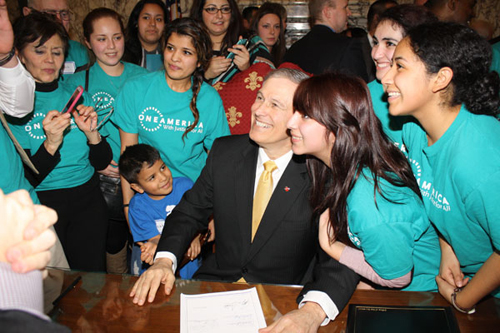By Associated Press

Gov. Jay Inslee poses for pictures with students while signing “The Real Hope Act” in Olympia. (Photo courtesy of OneAmerica)
OLYMPIA, Wash. – Gov. Jay Inslee signed a measure on Feb. 26 that expands state college financial aid to students who don’t have legal status in the United States.
The law is a key victory for immigrant advocates. Washington joins California, Texas, and New Mexico in approving similar legislation.
The Senate and House versions of the bill were almost identical, but had two dueling names.
The Senate’s version, which was the one signed into law, was dubbed “The Real Hope Act,” while “The Washington Dream Act” was the name the bill had in the House.
“Whatever you call it, what’s important is what it will do for thousands of bright and talented and very hard working students across the state of Washington,” Inslee said at the bill signing ceremony. “Today, we’re allowing dreams to come true.”
Signed in a ceremonial room in the Capitol, Inslee was surrounded by dozens of students, many of whom identified themselves as “Dreamers” — the moniker students without legal status have taken in their cause.
The mood was festive with a high school mariachi band from Wenatchee serenading the crowd before Inslee arrived. As Inslee signed the bill, the young crowd closed in and formed a circle, with smart phones held high to take pictures.
As Inslee sat down to sign the bill, the crowd began chanting, “Si se puede!” or “Yes, we can.”
To which the governor replied, “That’s right.”
After the bill was signed, Moses Chege’s hands were being held tightly by his mother. She had a wide smile as she looked up to her son.
Born in Kenya, Chege arrived in the United States when he was 6 years old. He graduated from high school last year and he’s currently applying for a temporary legal stay in the country under the federal program of Deferred Action for Childhood Arrivals.
“I don’t get teary, but it’s definitely emotional inside,” he said.
The House version didn’t identify a funding source, but the Senate proposal allocates $5 million through June 30, 2015, from the general fund, to pay for the financial aid payments under the state need-grant program. The bill requires students to have received a high school diploma or equivalent in Washington state and to have lived in the state for at least three years before getting aid.
Following the formation of the predominantly Republican coalition that includes two Democrats, the fate of the bill was in the hands of senators. In 2013, the House approved a version of the bill with bipartisan support, but the measure died in the Senate.
This year, the House passed the measure on the first day of the legislative session, immediately putting pressure on the Senate to act on it. The senators did, underlining their bill with $5 million in funding.
The measure was the first bill to be signed into law in the 2014 legislative session.
“The large bipartisan majorities that supported the Dream Act in our House and Senate is in striking contrast to what we have seen in Congress lately. Washington legislature’s action is a testament to the power of organizing and the growing influence of the immigrant vote in Washington state,” said Rich Stoltz, executive director of OneAmerica, an immigrant advocacy group.
Republicans Rep. Bruce Chandler of Granger and State Sen. Barbara Bailey of Oak Harbor both said they had a lot of push back from conservative constituents in their districts.
Both spoke to students in a ceremony hosted by the Latino/a Educational Achievement Project, a program funded by Sea Mar Community Health Centers, which also lobbied lawmakers. The group has been working on the issue for years, bringing in students to testify at panels and talking directly with leadership.
“We all can’t live in a cul-de-sac or in gated communities,” Chandler, his voice breaking, told the students. “We have to live as one community.” (end)




Any state “Dream” Act does two things:
Makes it easier for illegal aliens to get seats at state universities and therefore makes it tougher for citizens of the state to gain entrance.
Raises the taxes for the state’s citizens.